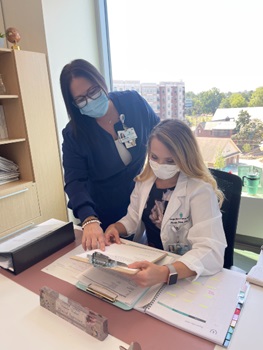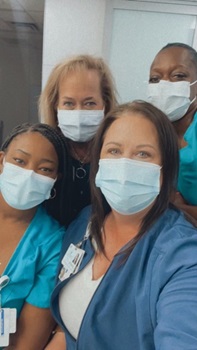Finding out you need to have a heart procedure can be overwhelming. Even after talking with your care team, you may have lots of questions about what to expect before, during and after the procedure. Having a resource you can turn to whenever you need guidance or support is critical to your long-term health.
Research shows that having a nurse navigator to guide you through the process will ensure the best possible results. Working with a nurse navigator helps:
- Reduce hospital readmissions and deaths.
- Improve the patient experience.
- Increase the likelihood that patients will keep their follow-up appointments.
For example, nurse navigators prepare patients by telling them what to expect after a procedure. That way they won’t feel the need to return to the hospital when they experience normal side effects that can be managed from home.
Nurse navigators are especially vital in assisting patients with complex cases of atrial fibrillation, an irregular or racing heartbeat, who require ablation. Ablation is a treatment that removes the irregular electrical signals that cause atrial fibrillation in the heart.
Sanger Heart & Vascular Institute Atrial Fibrillation Center of Excellence provides patients access to cardiac nurse navigators, who are specially trained in working with patients before and after ablation procedures.
Jennifer Smith, MSN, RN, the lead electrophysiology nurse navigator and program coordinator for the Atrial Fibrillation Center of Excellence, has supported cardiac patients at Atrium Health for almost 20 years. “It’s so rewarding to walk patients through the process, holding their hand and answering questions that come up,” she explained.
How did Jennifer decide to pursue a career in nursing? “I’ve had Type 1 diabetes since age 5,” she related. “Growing up in a small town in Georgia, there weren’t many resources for children with my condition. Whenever I was hospitalized, my pediatrician and his nurse would come to my bedside and care for me, providing whatever I needed. Seeing the compassion my doctors and nurses had for me as a child inspired me to get involved in healthcare as an adult.”
Learn how compassion, planning and organization help Jennifer make a difference for patients with atrial fibrillation as she walks us through a day in her life.
Jennifer starts her day with a cup of coffee. Waking up early gives her some quiet time for reflection. On her drive to work, she listens to worship music to help prepare her mind for the day.

Once Jennifer arrives at the hospital, she creates a calendar for all 3 nurse navigators in her department and highlights their tasks for the day. She prepares the department’s overall schedule a month in advance, making adjustments as needed.
Jennifer typically works a 40-hour week, supporting the day shift Monday through Friday. When emergencies arise, she makes herself available to her patients and teammates in the evening.

Jennifer conducts virtual visits with patients 3 days a week. “I love building relationships with them and getting to know them better,” she said. “Since starting virtual visits, patients seem to benefit from the face-to-face interaction, which enables better communication and outcomes. They definitely seem to trust us more when they can put a face to a name.”
The day before an ablation, Jennifer meets with the patient virtually to review the procedure and recovery process, discuss results from lab tests and scans and coordinate medications. She conducts these visits under the guidance of doctors’ orders.
Within three days of the procedure, she has another visit with the patient to answer any questions and review the normal expectations following the procedure. Jennifer remains the patient’s primary contact for 30 days.
Jennifer and her nurse manager often collaborate on projects for the navigation team.

Jennifer loves working with her teammates. They constantly communicate and share ideas in order to improve patient care.

On this special occasion, Jennifer was able to spend her day filming a promotional video for Sanger Heart & Vascular Institute Atrial Fibrillation Center of Excellence, explaining how the center provides holistic, multidisciplinary care for patients.

Her afternoon routine when she returns home from work includes going out for a walk and some fresh air.
At the end of the day, Jennifer checks the call list to ensure that all follow-up calls and visits are completed. She also verifies that all referrals and urgent tasks are handled.
Jennifer finds it beneficial to maintain a work-life balance and encourages her teammates to do the same. “I remind the other navigators that when they get to a good stopping point, stop for the day,” she said. “There will always be another project to start, but it could mean staying several hours longer than you planned. Maintaining a balanced schedule is vital for your overall health and well-being.”
After work, Jennifer loves going home to her supportive family, including her husband and 3 children. She also loves spending time with her 2 dogs, a goldendoodle and a German shepherd mix.

What’s Jennifer’s favorite part of her job? Seeing quality-of-life improvements for patients following treatment. “Patients with atrial fibrillation often struggle with walking and breathing, so it really slows down their lifestyle,” she noted. “To see these patients get back to doing the things they love – and with more energy – is so fulfilling. Patients often experience these improvements within the first 3 days after the procedure.”
Learn more about Sanger’s heart rhythm care. A team of experts offers dedicated care for atrial fibrillation, combining clinical experience with expertise in the latest technology.



